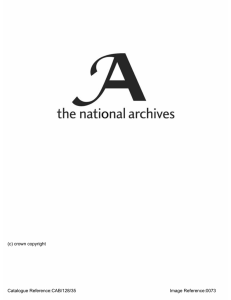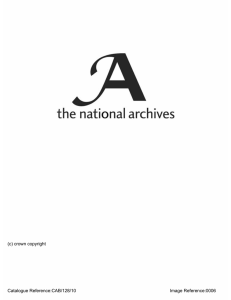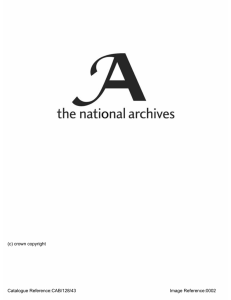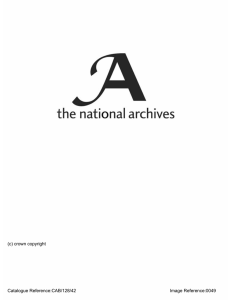(c) crown copyright Catalogue Reference:CAB/128/41 Image Reference:0005
advertisement
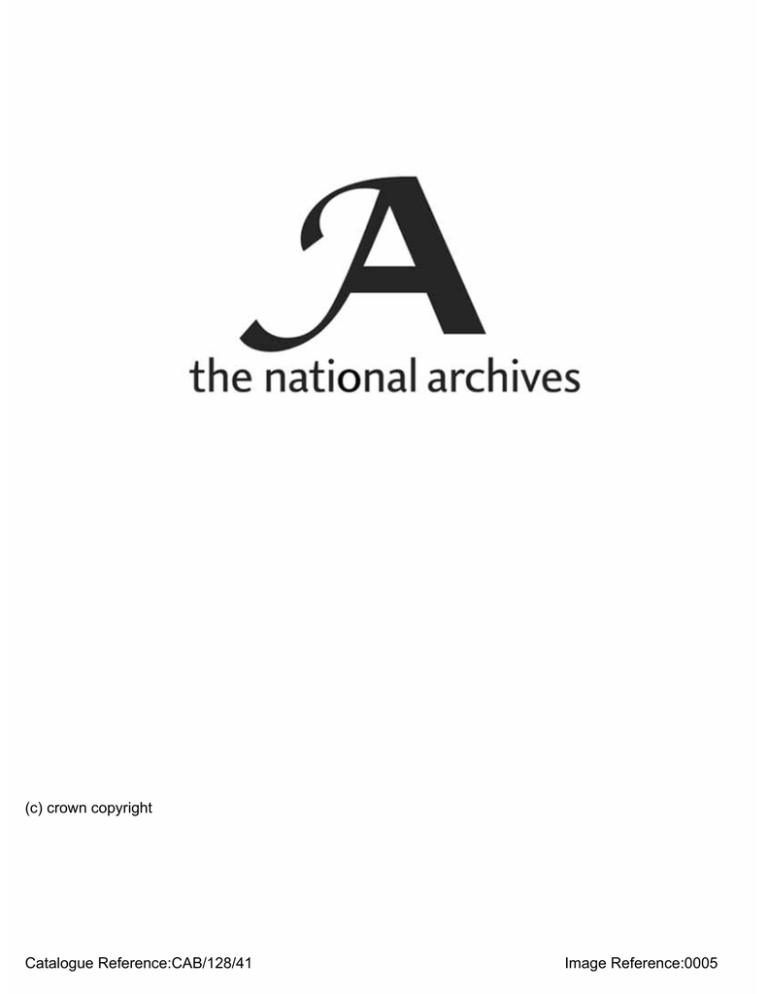
(c) crown copyright Catalogue Reference:CAB/128/41 Image Reference:0005 THIS DOCUMENT IS T H E PROPERTY OF HER BRITANNIC MAJESTVS GOVERNMENT Printed for the Cabinet. February 1966 CC(66) Copy N o . 3 5th Conclusions CABINET of a Meeting of the Cabinet held at CONCLUSIONS 10 Downing Street, S.W.1, on Thursday, 3rd February, 1966, at 10.30 a.m. Present: The Right Hon. HAROLD WILSON, M P, Prime Minister T h e Right Hon. GEORGE BROWN, M P, First Secretary of State and Secretary of State for Economic Affairs The Right Hon. LORD GARDINER, Lord Chancellor Secretary of State for Foreign Affairs Right Hon. R O Y JENKINS, Secretary of State Department M P, for the Home T h e Right Hon. JAMES GRIFFITHS, M P, Secretary of State for Wales The Right Right Hon. DOUGLAS Hon. The Right Hon. JAMES CALLAGHAN, M P, M p, Secretary of State for Common­ wealth Relations The Right Hon. WILLIAM R O S S , M P, Secretary of State for Scotland The Right Hon. T H E EARL OF JAY, M P , T h e Right H o n . ANTHONY GREENWOOD, RICHARD CROSSMAN, M p, Minister of Housing and Local Government (Items 1 and 2) T h e Right Hon. DOUGLAS HOUGHTON, M P , Chancellor Lancaster T h e Right H o n . ARTHUR BOTTOMLEY, LONGFORD, Secretary of State for the Colonies President of the Board of Trade The Lord President of the Council Chancellor of the Exchequer T h e Right Hon. MICHAEL STEWART, M P, The T h e Right H o n . HERBERT BOWDEN, M P, of the Duchy of T h e Right Hon. FRANK COUSINS, M P, M P, Minister of Overseas Develop­ ment The Right Hon. Sir FRANK SOSKICE, Q c, M p, Lord Privy Seal The Right H o n . R. J . GUNTER, M P, Minister of Labour The Right Hon. FRED PEART, M P , Minister of Agriculture, Fisheries and Food Minister of Technology T h e Right H o n . FREDERICK LEE, M P , The Right H o n . BARBARA CASTLE, M P, Minister of Power Minister of Transport The following were also present: Mr. REGINALD PRENTICE, M P , Minister of State, Department of Education and Science (Item 4) The Right H o n . EDWARD SHORT, M P , Parliamentary Secretary, Treasury Secretariat: Sir BURKE TREND Mr. P. ROGERS Mr. R . T . ARMSTRONG CONTENTS Minute No. Subject Page 1 PARLIAMENT 3 2 OVERSEA AFFAIRS 3 European Economic Community Vietnam 3 LEGISLATION ON THE DOCKS 5 4 PUBLIC EXPENDITURE 6 Rounding-off of Deferment Arrangements 5 G A S INDUSTRY 7 North Sea Gas 6 INDUSTRIAL DISPUTES Threat of a National Rail Strike 9 1. The Cabinet were informed of the business to be taken in the House of Commons in the following week. The Cabinet considered the position which the Government should adopt in relation to two Private Member's Bills, on Sexual Offences and Abortion respectively, which would come forward for debate in the House of Commons in the near future. They endorsed the recommendation of the Home Affairs Committee that the Government as a whole should adopt an attitude of neutrality in both instances, on the understanding that this need not preclude individual Ministers from expressing, if they so wished, personal sympathy with the objectives of the proposed legislation and that, in the case of the Abortion Bill, it might be appropriate to offer to make available the services of the official draftsman to assist in the preparation of any measure which might appear to be acceptable in principle to the House. 2. The Foreign Secretary informed the Cabinet that the six countries members of the European Economic Community (EEC) had recently met in Luxembourg in an attempt to resolve the differences which had developed between the French Government on the one hand and the Five Governments on the other hand. The outcome had not been wholly satisfactory to either party; but it might be thought that the Five had, on balance, derived greater profit from the encounter. The French Government could claim that they would still retain a virtual veto on the issue of majority voting in the Community; but this would not necessarily confer any practical advantage on them, since it had always been implicit in the working of the Community that the principle of unanimity could not, in practice, coerce any member Government to accept a decision which they judged to be contrary to their major national interests. It was perhaps more significant that the meeting had shown that the French Government were not prepared, in the event, to implement their threat to leave the Community if the outcome was not to their satisfaction; and, to this extent, there were some grounds for hoping that they would be more cautious in adopting tactics of this kind in the future. The results of the meeting did not suggest that there was likely to be any opportunity in the immediate future for an initiative by ourselves to enter into closer relations with the E E C . The Foreign Secretary said that, during the recent period in which the United States Government had suspended bombing operations against North Vietnam, we had maintained continuous contact with the Government of North Vietnam and with other Communist Governments, in the hope of establishing conditions in which negotiations to end the hostilities in Vietnam might be started. But there had been no response to our initiatives; and the latest statement issued by the authorities in North Vietnam, by insisting that negotiations could not begin unless the United States Government were willing unconditionally to cease all forms of attack on North Vietnam and to recognise the Viet Cong as the sole representative of the Vietnamese people, suggested that the attitude of the Government of North Vietnam had not changed. In these circumstances the United States Government had had no alternative but to resume bombing attacks on Vietnam. In a statement which had been issued by the Foreign Office we had indicated that we understood and supported this action. In the circumstances, however, we could have adopted no other attitude; and we should have been subject to even greater embarrassment if we had attempted either to defer any public indication of our attitude or to evade the issue of the extent to which United States policy had our general endorsement. The United States Government had now referred the issue to the Security Council; and we should therefore take this further opportunity to renew our efforts to promote a settlement in the context of a reconvened Geneva Conference. In discussion considerable disquiet was expressed about the impact, particularly on the Governments supporters in the House of Commons, of the Foreign Office statement on the resumption of United States bombing of North Vietnam. It was unfortunate that the Cabinet had not been given an opportunity to express a collective view on the wording of this statement, particularly since its apparently uncritical endorsement of United States policy might involve the Government in subsequent embarrassment if it became clear that, so far from promoting an end of the hostilities, the United States action was merely aggravating the tension. On the other hand criticism of this kind could be argued to do less than justice to the efforts which both the United States Government and we ourselves had made to promote negotiations for a peaceful solution of the dispute. It was our own initiative which had originally persuaded the United States Government to institute a short bombing truce over Christmas and to extend it thereafter for a longer period than they had originally envisaged. It had always been implicit in this initiative that if, having responded to our pressure in this respect, they failed to elicit any response from the Government of North Vietnam, they would have no alternative but to resume the bombing attacks, particularly in the light of the increasing number of casualties which their forces were sustaining. It was unreasonable to expect them in these circumstances to accept the unilateral terms which the Government of North Vietnam, in their most recent statement, had stipulated as conditions of negotiation; nor could we ourselves hope to retain our influence in working for the restoration of peace in Vietnam if we sought to press the United States Government beyond the point of concession which they had demonstrated, by the recent truce in the bombing, that they were prepared to contemplate. Both we and they had shown great patience in the face of unduly critical attacks on our policies in relation to Vietnam; it was now for others to show a similar degree of restraint while we continued our efforts to promote a settlement of the dispute on reasonable and honourable terms. From this point of view, it was satisfactory that a Motion which had now been tabled in the House of Commons, endorsing the Governments policy, had already attracted a very considerable measure of support from the Governments supporters in the House. Legislation on the Docks The Cabinet considered a memorandum by the Chancellor ( ) 21) on proposals for legislation for improving the efficiency of the docks. 3. o f t h e E x c h e q u e r C ( 6 6 The Chancellor of the Exchequer said that the Committee of Ministers which had been considering this issue had agreed upon proposals for a Bill to be presented jointly by the Minister of Labour and the Minister of Transport. The Bill would have four main features: (i) It would provide for a system for licensing port employers, so as to enable port authorities to promote a reduction in the number of employers. This was an essential preliminary to full decasualisation and the provision of regular employment for all dock workers. The licensing authorities would be port authorities (not the National Ports Council as recommended by the Devlin Report); employers would have a right of appeal to the Minister against a decision by a port authority, and the National Ports Council would also have the right to make objection to the Minister against a port authority's proposals. (ii) The Bill would place responsibility for the provision of welfare amenities on employers who owned their own dock facilities and, in other cases, on port authorities. (iii) Harbour authorities would be given more powers to promote port efficiency, including powers to acquire land and facilities and also to enable them to operate inland depots in order to reduce congestion at ports. (iv) The Minister of Transport would be given power to direct the National Ports Council to submit particular schemes of reorganisation, and powers to settle the lines of the investment programmes of independent harbour authorities. A study of the implications of even more substantial changes in the ownership and reorganisation of the docks was in hand but the Committee believed that the action he had outlined was necessary whatever further measures might be required at a later date. In discussion the Cabinet were informed that the study in question was now expected to be completed within the next few weeks. Some of the provisions in the proposed Bill might prove to be inappropriate if the Government were contemplating the introduction of more far-reaching changes in the docks at an early date and since the timetable for the study of such changes had been accelerated, it might be preferable not to take decisions on the legislation now proposed, despite its urgency, until it could be considered in the wider context. The Cabinet— Agreed to resume consideration of C (66) 21 at a later meeting. Public Expenditure (Previous Reference: CC(66) 3rd Conclusions, Minute 7) Rounding-off of Deferment Arrangements 4. The Cabinet considered a memorandum by the Chancellor of the Exchequer (C (66) 22) on proposals for modifying the arrangements for slowing down the rate of expenditure on capital projects and on stores and equipment in the public sector. The Chancellor of the Exchequer said that the measures announced in July 1965 had included arrangements for the deferment for six months of all capital expenditure projects other than those in certain exempted classes (notably housing and school building). This was a continuous " rolling forward " by six months until further notice of all projects affected. While it was essential to retain the benefit of these savings, the time that had elapsed made it no longer possible to continue to operate in terms of deferred projects. The continuation of these arrangements would therefore be in terms of new expenditure limits: departments would work out the expenditure which would have arisen in 1966-67 on projects deferred in the first six months of the operation of the scheme, and would deduct that sum from the planned capital expenditure limit for the year. The resulting sum would be their new limit on capital expenditure for 1966-67, and they would be able to re-programme investment within that limit. This principle had been applied in preparing the 1966-67 Estimates and the' methods of its application had been agreed with the Ministers concerned. He proposed to make a statement in the House of Commons on this matter, on the lines of the draft attached to his memorandum. In discussion the following points were made: (a) The particular form of the arrangements proposed would have a serious impact upon the Home Office capital expenditure programme, particularly in respect of the police: if there were no adjustment, they would be unable to start any new operational projects. Any modification to take account of this point would not prejudice the programme of other Ministers. (b) The Foreign Office and the Ministry of Public Building and Works would discuss with the Treasury the programme for capital expenditure on buildings for the Diplomatic Service in 1967-68 and subsequent years. CC 5 (66) (c) It would be convenient if the Chancellor of the Exchequer could make his proposed statement not later than 8th February. (d) It would be helpful to add to the second paragraph of the draft statement an indication that the deferment had contributed not only to the improvement in the balance of payments but also to reducing the load on the building industry which had restricted new housing. (e) The intention to modify the form of control on capital expenditure rather than to relax it might not be sufficiently clear from the third paragraph of the draft statement, and particularly from the penultimate sentence. (/) The position of the classes of capital expenditure exempted from the six months' deferment should be made clear. (g) It was suggested that the fourth paragraph of the draft statement should be modified to make it clear that special consideration would be given for local authority projects in development areas. In view of the wide extension of the development areas, however, this could amount to a substantial relaxation, and the balance of opinion was that it would be preferable not to amend the statement on these lines. This aspect would nevertheless require further consideration thereafter. The Cabinet— (1) Approved the proposals by the Chancellor of the Exchequer for modifying the arrangements for slowing down the rate of expenditure on capital projects and on stores and equipment in the public sector. (2) Invited the Chancellor of the Exchequer to amend the draft statement annexed to his memorandum to take account of the points made in discussion and to circulate a revised version to the Public Expenditure Committee. (3) Subject to Conclusion (2), agreed that the Chancellor of the Exchequer should make an early statement on his proposals in the House of Commons. (4) Invited the Chancellor of the Exchequer and the Home Secretary to consider how these arrangements should be applied to capital expenditure on Home Office Votes. 5. The Minister of Power said that the Gas Council and the North Sea Gas British Petroleum Company (BP) were now ready to conclude an agreement on the supply of gas from the North Sea. The Gas Council had for some time been concerned about the supply and price of naphtha, on which most of their new processes depended, and had therefore been investigating the possibility of easing their position by the additional use of natural gas from abroad. He had warned them that, when there were possibilities of United Kingdom Gas Industry supplies, it would be difficult to justify any further imports, which had to be undertaken on the basis of long-term commitments over some 15-20 years. BP had put forward proposals for a very rapid exploitation of their North Sea drillings. This they believed to be in the national interest though it involved certain risks. They had originally sought a price from the Gas Council of 6d. a therm, while the Council for their part had offered 4d. plus an additional contribution of a \d. a therm for a limited period towards the installation of a larger marine pipe than BP regarded as commercially justifiable at the outset. Agreement had been reached between them on a price of 5d. a therm, on a temporary basis and without any contribution by the Gas Council to the cost of the marine pipe. This price was valid only up to an average delivery of 100 million cubic feet a day and for a period of three years from the date of commencement of a guaranteed supply or from 1st July, 1967, whichever was the earlier. Above the stipulated quantity in the first three years and for all supplies thereafter, the price would be for re-negotiation. BP would from the outset and at their own risk provide a marine pipe capable of carrying 200 million cubic feet a day and the Gas Council would make at least equivalent provision on land. The price which had been agreed was substantially below the price of 6^d. a therm in the contract for the supply of gas from Algeria, was lower than the estimated price of 5 T 8 d . for imported methane gas from Nigeria and was competitive with the estimated price of Dutch gas having regard to the lower quality of the latter which contained some 15 per cent nitrogen. There was no question of fixing now a price for North Sea gas in general. With the discovery of larger quantities and some experience of costs we could reasonably look for a significant reduction below 5d. a therm. The longer-term issues involved would be the subject of interdepartmental examination; meanwhile, it would be made clear that the price which had been fixed was a limited and temporary arrangement without prejudice to the longer term. Subject to the approval of the Cabinet, he proposed to make an oral statement to this effect in the House of Commons on Friday, 4th February. In discussion anxiety was expressed that the agreement which had been reached should in no way prejudice the prospect of a substantially lower price for North Sea Gas in the longer term. In particular it was suggested that, if the cost of production were later shown to permit a substantially lower price for the total supply from BP, it might be desirable to re-negotiate the price for the initial quantity of 100 million cubic feet a day in the first three years. It was, however, pointed out that, if quantities substantially beyond 100 million cubic feet a day became available, it would be possible to fix a much lower price for these which would give a reasonable rate when averaged over the whole production. It was moreover reasonable that at the outset an agreement should be made in the terms proposed, having regard to the initial risks and the desirability of encouraging the earliest possible exploitation of the North Sea gas supplies; and it would be made clear that there was no question of the initial agreement prejudicing the negotiation of the price for later contracts, whether with BP or with other companies which had concessions in the North Sea. The Cabinet— Agreed that the Minister of Power should make a statement on the agreement between the Gas Council and the British Petroleum Company for the supply of gas from the North Sea in the terms which he proposed. Industrial Disputes Threat of a National Rail Strike (Previous Reference: CC(65) 40th Conclusions, Minute 3) 6. The Home Secretary said that, although the Official Committee on Emergencies had considered the measures which would be required should the railway strike which was threatened for 14th February take place, he had so far postponed any meeting of the Ministerial Committee on Emergencies with a view to action being initiated, since these measures involved consultation with outside organisations. Such consultations would inevitably become known and might therefore adversely affect the efforts which were being made to avoid a strike. The initiation of these precautions could, however, no longer be postponed if they were to be completed by the time the strike was due to take place; he therefore proposed to hold a meeting of the Ministerial Committee that afternoon and to proceed thereafter with the necessary consultations if the Committee so agreed. In discussion there was general agreement that it would be imprudent to delay further the initiation of the necessary precautionary measures unless there were developments during the course of the day which offered a substantially more hopeful prospect that the strike would be avoided. The Cabinet— Took note of the Home Secretary's statement. Cabinet Office, S.W.1, 3rd February, 1966.


